1.0 Introduction
The New Devon survey was launched on July 18, 2025 to seek the views of Devon residents on a range of local authority services and to understand community aspirations for the 2025-29 council term.
A questionnaire was prepared using the Commonplace community engagement platform and utilising standard ‘place’ survey questions.
Such surveys and community engagement activities have several benefits, including that they:
- provide evidence-based insights to guide policy, planning, and resource allocation, helping to identify priorities for investment or improvement based on actual community needs.
- encourage residents to voice their opinions, fostering a sense of involvement and ownership and building trust between the local authority and the community by showing responsiveness to feedback.
- track satisfaction with services like waste collection, public transport, housing, and community safety. Enables benchmarking over time or against other authorities.
- highlight specific areas where services are underperforming or where residents feel underserved.
- support the development of tailored interventions to address local issues.
- demonstrate a commitment to listening and acting on public concerns.
- inform long-term strategies such as the Devon County Council 2025/29 Strategic Plan and Local Government Reorganisation proposals.
1.1 Survey design, implementation and promotion
The survey asks multiple choice questions about residents’ expectations from future local Government and priority areas and enable free text responses to be submitted for artificial intelligence analysis. It collects significant demographic data about participants to aid understanding of different cohorts’ views.
The survey was launched on July 18, 2025 and will remain open until October 14, 2025. It is supported by an aspirational, fresh brand emphasising opportunity and new beginnings.
It was supported by a multi-channel communications campaign comprising:
- Traditional media editorial and advertising campaigns
- Targeted social media advertising
- A ‘roadshow’ visiting 28 cities and towns across the county
Specific efforts were made to engage ‘hard to hear’ communities who are typically under-represented in such surveys. These include people with experience of the care system, younger Devon residents and minority ethnic communities.
1.2 Understanding the results
The results in this report were extracted at 2.55pm on Tuesday 19 August after 2,782 survey contributions. Quantitative results are presented in the chart format and qualitative data (open text) responses are aggregated and summarised by artificial intelligence tool TrendsAI. The data presented in this report has been altered to be representative of a particular community, although the number of respondents has exceeded that required to be deemed ‘statistically significant’ for a county with a population the size of Devon’s.
TrendsAI was developed specifically for local government consultations. Trained on over 12 million public responses, it currently achieves:
- 95%+ topic precision – correctness of topics identified (very strong compared for industry standards)
- 80% topic recall – completeness of topics identified (over 150 topics are created for each domain such as planning, transport, sustainability etc.)
- 80% sentiment accuracy – correctly identifying tone as positive, neutral, or negative (on par with human accuracy)
2.0 Results
2.1 Narrative summary
Residents across Devon express a deep appreciation for their natural surroundings and community spirit, but also raise urgent concerns about the challenges facing young people and the environment. While the county is widely seen as a beautiful and family-friendly place, many feel that rapid development, underinvestment in services, and environmental degradation are threatening its character and future.
A recurring theme is the need to support young people more effectively. Residents highlight a lack of affordable housing, limited job opportunities, and insufficient youth services, particularly in towns like Ilfracombe and Holsworthy. There are calls for more youth clubs, safe recreational spaces, and inclusive community events that bring together younger and older generations. Many link rising antisocial behaviour to boredom and a lack of safe, structured environments for young people. Public transport is also a concern, with suggestions for better evening and rural bus services to improve access to employment and social opportunities.
Families also report challenges in raising children in Devon. While the area’s natural beauty and community values are praised, there are concerns about inadequate play areas, limited SEND support, and rising housing costs that make it difficult for young families to stay in the region. Parks like Rock Park in Barnstaple are seen as needing investment, and there is a strong desire for more family-focused infrastructure, including affordable housing, accessible healthcare, and better public transport.
Healthcare access is another pressing issue. Residents report long waiting times for GP appointments, a shortage of NHS dentists, and under-resourced hospitals like North Devon District Hospital. Many fear that housing growth is outpacing the capacity of local health services. There is a strong call for urgent investment in healthcare infrastructure, better alignment between planning and service provision, and a halt to further development until essential services can cope.
Environmental concerns are also widespread. Devon’s rivers, canals, and coastlines are cherished for their beauty and biodiversity, but residents are alarmed by pollution, particularly from South West Water, and the impact of overdevelopment on green spaces. The River Exe and Grand Western Canal are frequently mentioned in relation to sewage discharge, invasive species, and loss of natural habitats. There is a strong desire for cleaner water, protection of greenfield sites, and greater environmental accountability from both local authorities and utility providers.
Residents are calling for stronger protections for the environment, including better management of waterways, investment in biodiversity, and community involvement in conservation efforts. Many feel that the natural environment is being neglected in favour of short-term development, and they want to see a more balanced, sustainable approach that safeguards Devon’s landscapes for future generations.
In summary, Devon residents are united in their desire to protect what makes their communities special—supporting young people, preserving the environment, and ensuring that development is matched by investment in essential services. They seek a future where Devon remains a vibrant, inclusive, and sustainable place to live for all generations.
2.2 Results by question
What is most important to you? (participants are asked to rank 10 areas in order of priority)
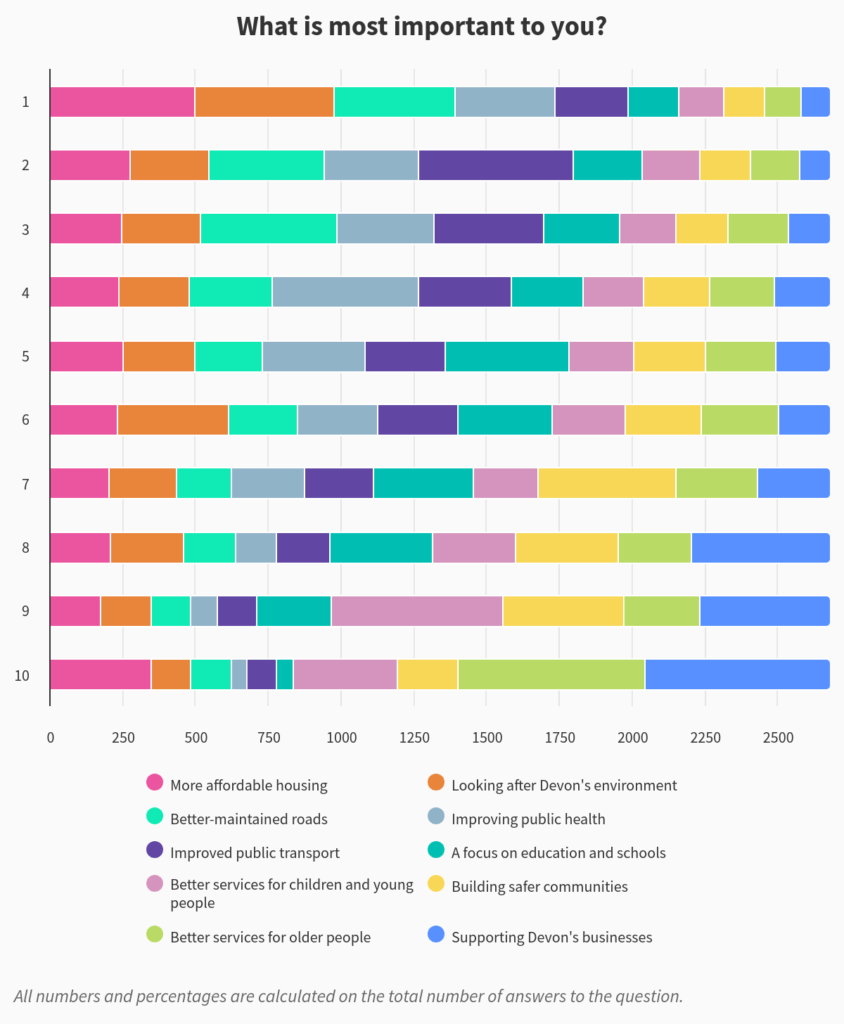
What else is a priority for you? (open text)
Devon residents are concerned about social care for children and the elderly, affordable housing, and infrastructure improvements in towns like Barnstaple and Torquay. There’s a strong need for effective local governance that addresses community voices on planning issues, alongside better policing and public safety measures. Many advocate for preserving Devon’s natural environment and community resources, while resisting housing developments on green spaces. Residents highlight the importance of maintaining public toilets and improving town centre cleanliness to enhance community access.
To what extent do you feel a sense of belonging or personal connection to the county of Devon? (5=very strong, 1=very weak)
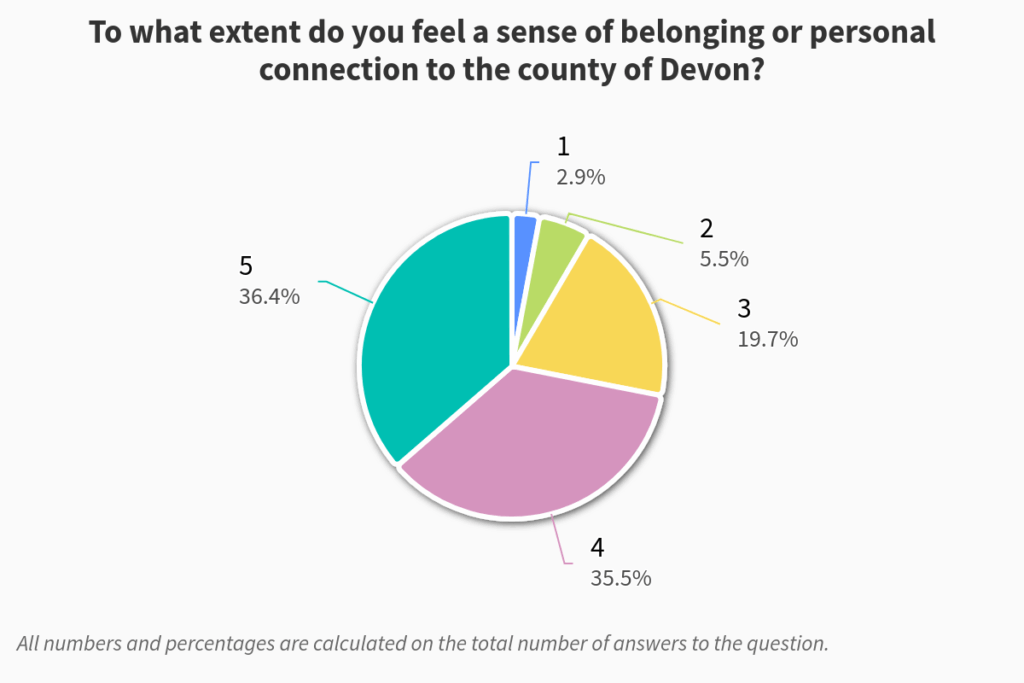
Would you like to add anything else about your personal connection to Devon? (open text)
Residents of Devon express a strong emotional connection to places like Exeter, Plymouth, and Dawlish, celebrating the area’s beauty and community spirit. However, they voice significant concerns over housing developments, rising costs, and the loss of local identity, especially in places like Okehampton and North Devon. While long-term locals feel pride in the community, newcomers often feel disconnected. The comments highlight a desire for improved infrastructure and services to maintain Devon’s character amidst rapid changes. Overall, the sentiments reflect a mixture of affection for the region alongside anxiety about its future.
What do you value most about your local area? (open text)
Residents of Devon cherish their community spirit and the stunning natural landscapes, particularly Dartmoor and the coastline, which provide ample green spaces. Many enjoy local recreational activities and appreciate the friendly atmosphere. However, there are growing concerns over overdevelopment, rising crime rates, and the deteriorating condition of public spaces, especially in Exeter. The balance between preserving the unique character of the area and accommodating growth is crucial to local residents, emphasizing the need for sustainable development practices.
How important to you is Devon’s natural environment? (5=very important, 1=not at all important)
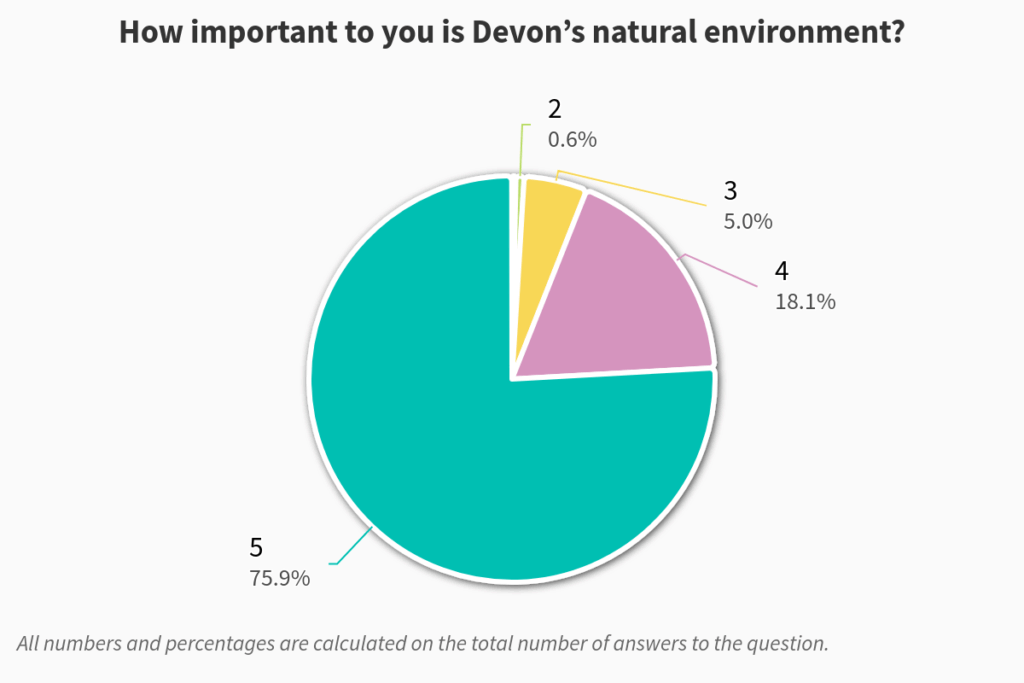
Would you like to add anything else about Devon’s natural environment? (open text responses)
Devon’s natural environment faces dire threats from overdevelopment, pollution, and inadequate infrastructure, with Dartmoor, Wembury, and Exeter highlighted as critical areas needing protection. Residents are passionate about maintaining the beauty and biodiversity of these locations and call for sustainable planning and investment in green spaces over urban sprawl. Concerns revolve around excessive housing developments on green fields and the urgent need for better management of natural resources and public engagement in decisions affecting the environment.
What would you like to see more of in your community? (1=top priority, 6=lowest priority)
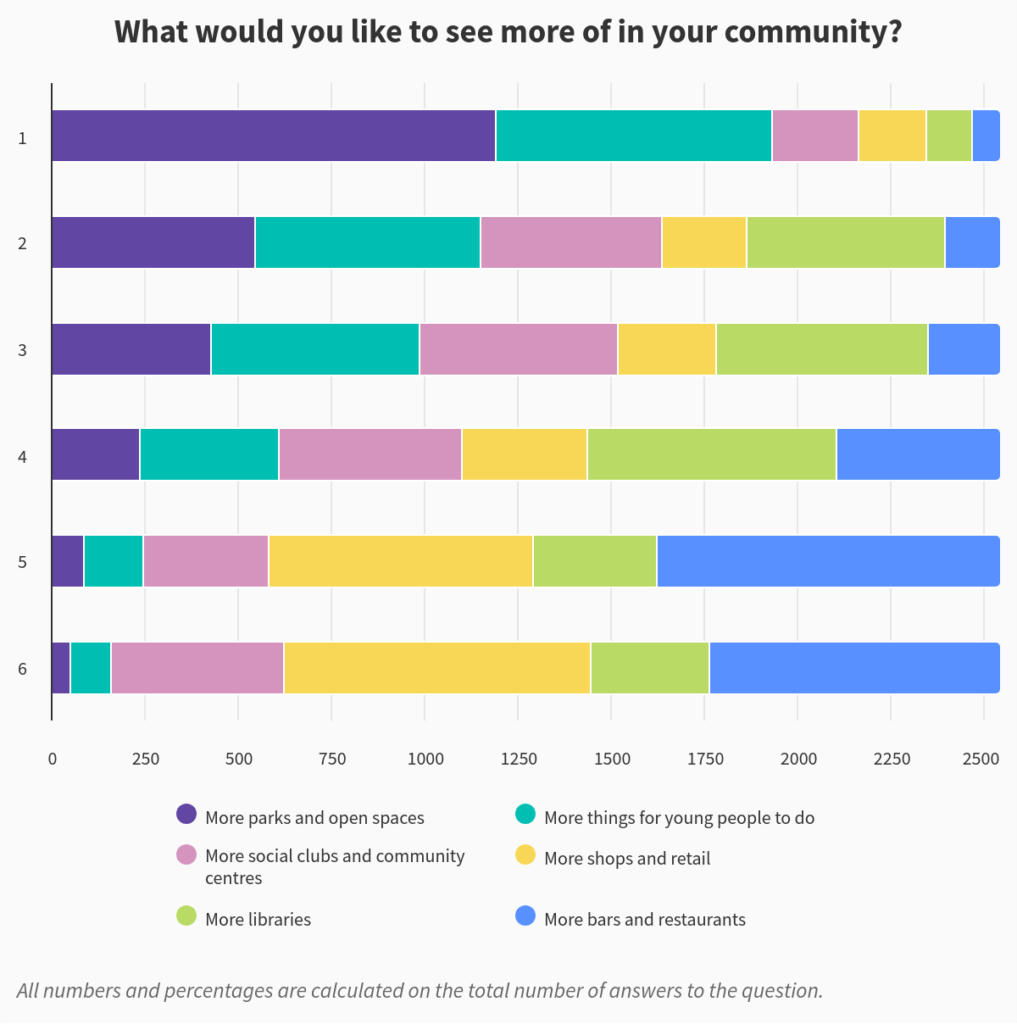
Is there anything else you would like to see more of? (open text)
Respondents across Exeter, Barnstaple, and rural areas emphasised the importance of improving maintenance of existing parks, libraries, and community spaces rather than focusing on new developments. Specifically, suggestions include enhancing social spaces for all ages, tackling litter and weed issues, and improving public transport links, especially between Plymouth and smaller communities. There is also a call for better police presence to address antisocial behaviour and a desire for more youth centres and recreational facilities. The focus remains on fostering community connections and a vibrant local economy.
Would you be interested in participating in local decision-making (for example community meetings, online forums)?
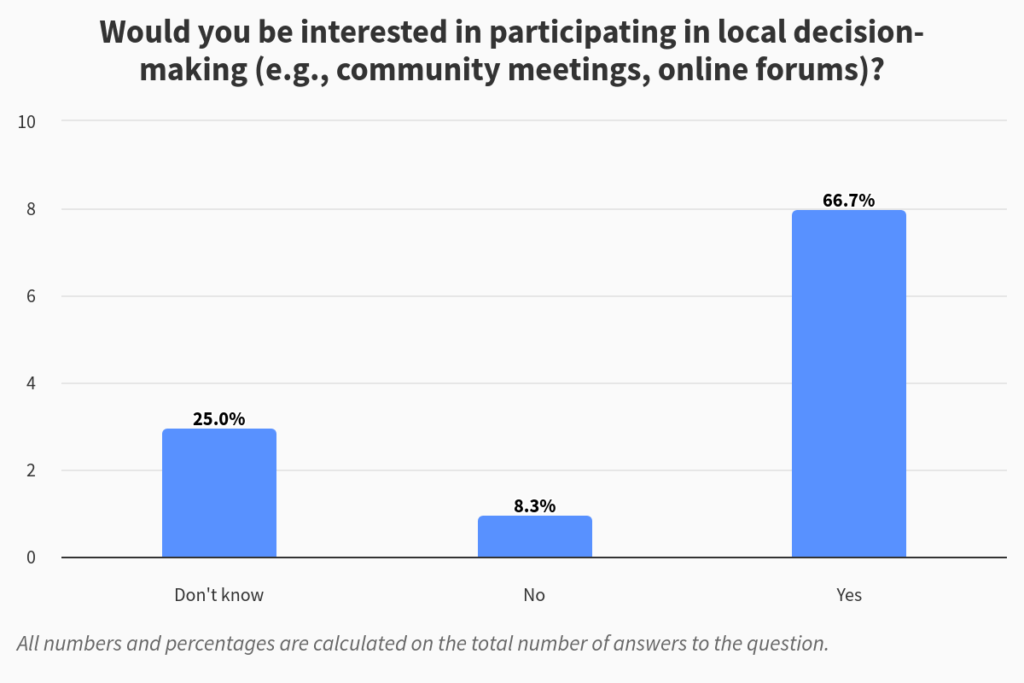
If you have contacted Devon County Council in the past three years how happy were you with the way you were dealt with?
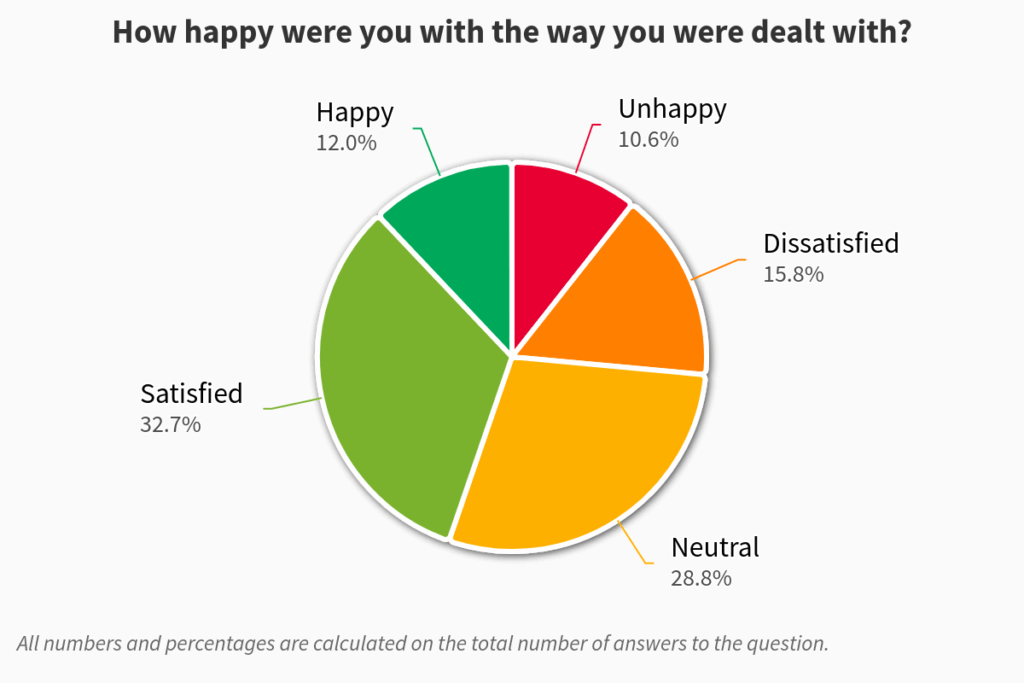
If you needed to get in touch with your local council, what method would you prefer to use?
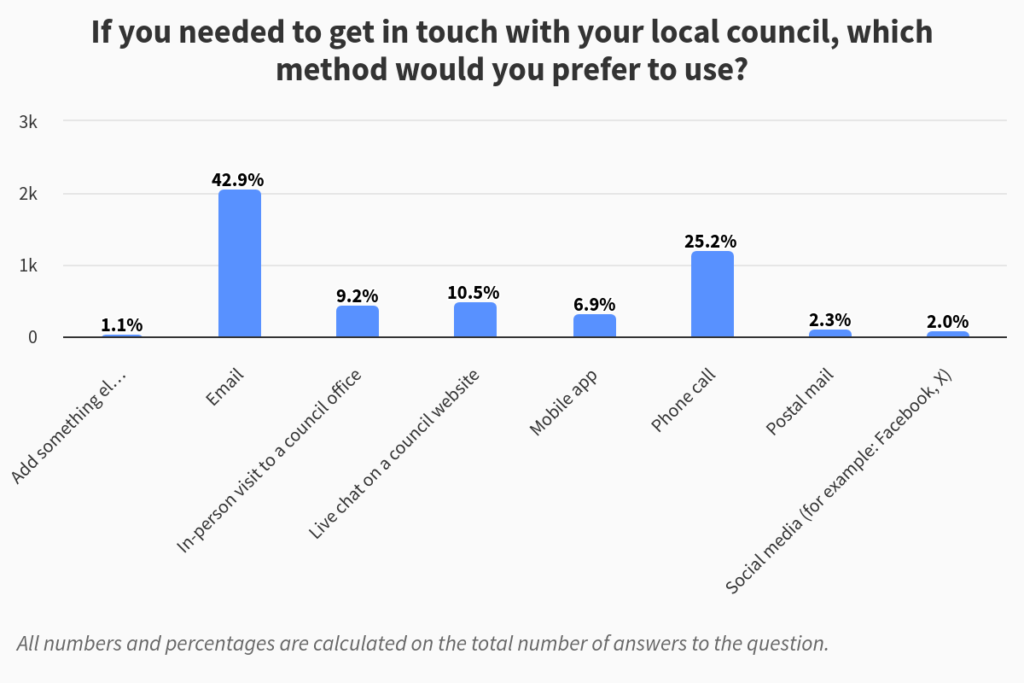
Is there anything else you’d like to say about how councils should deal with customers? (open text)
Residents expressed frustration with communications at some of Devon’s district councils, calling for improved, human interactions over automated systems. Many voiced the need for face-to-face contact and accessible phone services, highlighting issues like road closures that isolate villages and the lack of response to local concerns. Suggestions include improving website navigability and ensuring staff are trained to communicate empathetically. A push for transparency and accountability in local council interactions is paramount for fostering trust within the community.